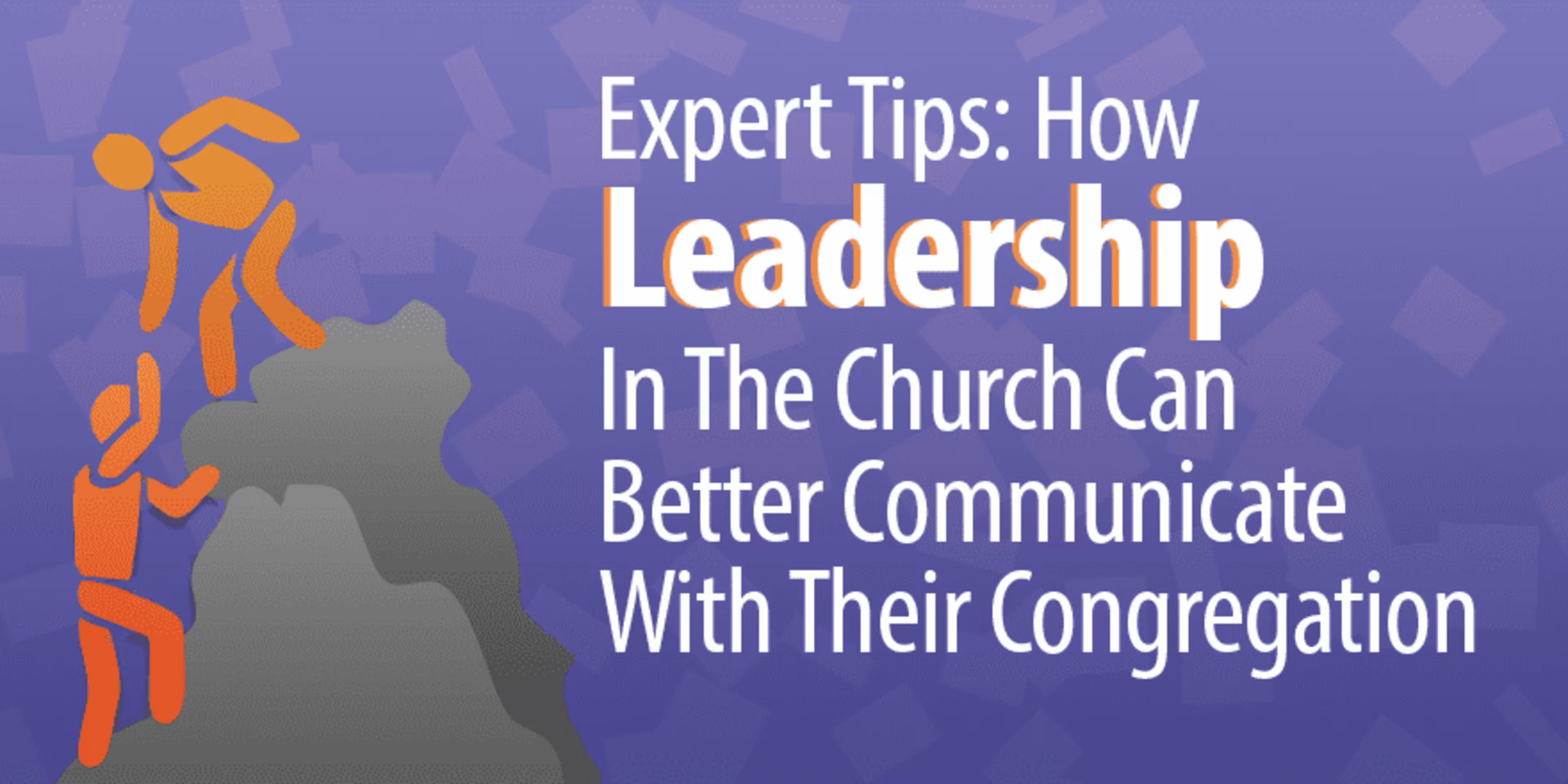A church leader's most important job begins when the service ends.
All the preparation and coordination it takes to put together a compelling sermon and musical performance leads up to a great show on Sunday morning, but how do you transition from speaking to your congregation to talking with individual members of your congregation as they return to the outside world.

The overarching ideas you share with your captive audience can have a big impact as far as inspiration and guidance, but what about the widowed senior who is lonely and just wants someone to share a meal with after church? Or the adolescent who is ashamed for doubting their faith and pines for someone to candidly talk to about their spirituality?
In other words, how can leadership in the church communicate with their congregation better?
8 communication tips for leadership in the church
We're not experts in church communication, far from it. But we do know a thing or two about church technology and communicating online, so we asked the experts for their tips, and here is what we heard.
1. Don't be afraid to connect via social media

"I have found that the use of social media platforms have provided a fun, interactive way to communicate better with ... small groups. Technology is always advancing and I think church leaders should be opening to embracing it and using it to connect with their congregation and small groups. Our single's Facebook & Instagram pages have been our largest line of communication and discussions prior to meetups and sessions. Email is also a very viable tool in communicating. When using all of these platforms, we focus on using lots of visuals, video clips and engaging subjects and topics that will engage these groups. In addition, it encourages members to share with their friends and others that are not in the group, therefore meeting outside people as well. Lastly, I think texting is perfect for small/niche groups. We incorporate group texting when sending out reminders of an upcoming event or needing quick feedback for new ideas."
-Trunae A. Green, Singles and Teen Ministry Leader, Family Life Missionary Baptist Church, Jonesboro, GA
How you can use this tip: Check out our guides on Facebook, Instagram, and Twitter for church communications. And remember that, above all, you should be using social media to communicate with your congregation only if it's where they are comfortable communicating. Don't try to shoehorn Snapchat into your communications just because it seems like the trendy thing to do. No one needs to see their pastor with jelly beans for eyes and rainbows streaming out of her ears when they're trying to have a serious conversation about faith.
2. Talk about your own experience to forge trust

"In engaging with people (especially young adults in my experience), it's key to begin with opening up our own relevant past to relate to the struggle or issue they are now facing. Everyone is generally fearful to disclose our secret sins, yet those are the ones which must be dealt with for us to experience deliverance and be transformed. So when we (are) transparent in sharing our similar past, people start to relate to you and the lie that they are the only one who sins or struggles this way will be immediately exposed. Once they know there are people who struggle like them yet can be victorious over the stronghold, their hearts are softened and they start to open up their journey. That's when repentance, healing and deliverance start to take place in their life. All these take personal touch, (which) means it's best to be talked through face-to-face in person, so the foundation of the relationship can be established."
-Stephanie Cristal D., Founder & Life Risk Specialist, ToHerHeart.com
How you can use this tip: It does no good to perpetuate the myth that priests and pastors are divine beings free from the temptation of sin. Mutual trust and respect establishes lines of open communication. This doesn't mean revealing your deepest, darkest secrets to every member of your church, but it can mean dressing casually at a church barbecue, talking honestly about a time that your faith was tested, or maybe a time that you lost your temper. Remember, nobody is perfect, so you're not fooling anyone if you try to act like you are.
3. Texting is better than not communicating at all

"I work with our church in keeping up with those that might be drifting away. We do three things:
• Consistently update content on YouTube so our services are still active. • Use Facebook to communicate and pray for those that are drifting away. • Pastor loves to text. So he texts everyone often—including those that are drifting away.
In other words, we meet them where they are at without compromising our beliefs."
-Clark Covington, Glory Bound Baptist Kings Mountain, NC
How you can use this tip: It may seem unprofessional or inappropriate at first glance for a church leader to exchange text messages with their parishioners, but why is this? How, really, is a text message different from an email or a brief phone call? If a text message is the lifeline that can help a lost soul, why wouldn't you use it? More than 90% of smart phone owners communicate via text, including virtually 100% of those aged 18-49, so if you're avoiding texting you're closing off a vital line of communication.
4. Church apps can also help keep everyone connected

"Our pastor, Reverend Lex DeLong, sends frequent emails with prayer requests and updates for the church. We also use Facebook for communication via our Facebook page and we have a private group for prayer requests and praise. We also recently got a church app which helps us with announcements. Being a small church, everyone is very close and connected with one another and it's easy to keep track of everyone on Facebook especially."
-Kimberly Erskine, Washington Baptist Church, Washington Township, NJ.
How you can use this tip: There are lots of great tools out there for building an app for your church. Considering that almost 80 percent of Americans own a smartphone, a church app can be a great way to make yourself available to your congregation wherever they are, any time of day. They may be reluctant to pick up their phone to call you, but if your app gives them an easy way to email, connect on Facebook, or call, you give them a hub for accessible communication right in their pocket.
5. Group text messages offer advantages, too

"The best way I have found to communicate is via group text message. Almost everyone has a cell phone these days and can get text messages. A simple reminder or question this way should reach everyone, it is better than email. This method may not be as effective for seniors, but with a little patience you might be surprised that they will learn if asked."
-Dustin Montgomery, Digital Marketing Specialist and small group church leader.
How you can use this tip: Sending group texts not only encourages community interaction and makes planning easier, it also offers transparency to take some of the negative stigma out of texting with your congregation. Of course, some communication—for example, if a parishioner is having trouble paying their mortgage—is better done over private channels. Group texts can also be a great gateway for seniors who are unfamiliar with texting. If a lively conversation is magically appearing on their phone, they may be more likely to participate. *Standard text message rates apply.
6. Encourage better communication by asking questions

"(Our) Executive Board has weekly discussions on innovative ways to reach the congregation through programs, events, services, and partnerships. Millennials and everyone up to [seniors] are invited to get a range of what people are looking for. We have over 30 ministries (for women, for married persons, for youth, for seniors, for singles, diversity groups) to address the various needs of our congregation. This allows like-minded individuals to address things that matter most to them and their needs. We provide opportunities to have open dialogue with each other for knowledge, understanding, and awareness."
-Pastor Ronald Godbee, River Church, Durham, NC
How you can use this tip: There is no catch-all solution to improving communication with your congregation, but Godbee does touch on a great overall approach to improving communication: asking rather than telling. Church leaders may feel undue pressure to provide all the answers, when their congregants really just need someone to ask them how they're feeling, what they need, why they're struggling. Remember also that communicating with your congregation means communicating with other leaders in your church. Better communication has a trickle-down effect, and the youth pastor that you help will be empowered to help many others.
7. Old school visitation is still cool

“One of the most effective yet under-utilized methods for effective church leadership is old school visitation. Going to people's places for dinner/dessert or meeting for lunch is the best way to generate buy in and community in general. It has long ranging effects as well: You can learn what kind of communication people expect and actually read. You can 'prime the pump' by relating how you intend to communicate: 'I'll email the first Monday, and look for responses that Friday.' and things like that. With higher buy in, a greater appearance of personal interest, and open plans you've got a good shot at dissemination."
-Paul Leonard, M.DIV. Biblical Studies, Fuller Theological Seminary
How you can use this tip: Just because all the music and preaching takes place in the church doesn't mean that all the meaningful communication needs to happen on church grounds, too. You can take a page from the Bible and literally break bread with your congregation. As Leonard says, getting out into the community is the best way to build community. You can invite small groups of seniors into your home for dinner and discussion. Or you can meet up with someone who is struggling with a moral issue for coffee. Or chaperone a group of adolescents for pizza and pop at the roller rink. Get out there and be with your people.
8. Make a friend by being a friend, and keep congregation size manageable

“There is no substitute for personally knowing and befriending people. That's why I'm not a fan of the mega-church model. Our congregation is about 150 people. Interestingly, (Robin Dunbar) argues that 150 is the optimal size for a community. The evidence he has gathered suggests human beings cannot have meaningful personal relationships with more than that number because we can't retain enough information about them to make our transactions with them meaningful. Certainly, having been part of (our congregation) for ten years, I feel integrated within it in a way I haven't within any other community (whether working, neighborhood, or social). I know the people well enough to understand why they do and say the things they do and say, which in my view is essential to treating each person with understanding and compassion. A call to good neighborliness is not theoretical and is much easier to practice when one actually knows and understands one's neighbor. The development of a theory of mind steeped in Christian values is one of the benefits and disciplines of long term connection to a church community. The best communication occurs not when people are being lectured at from a pulpit, but when they are being spoken to as friends."
-Lesley-Anne Weir, Trial lawyer, wife, mother, Christian (elder in Church of Scotland)
How you can use this tip: As Weir says, this tip mostly applies to smaller churches, but even megachurches can use this advice by applying it to staffing ratios. If you don't have at least one dedicated church leader for every 150 or so members, you might want to look into hiring more. A good way to estimate 150 people is to imagine how many guests are at a typical wedding (and not a wedding involving one of the Kardashians). With too many people, you risk coming across more like a delegate to your congregation than a neighbor. If your congregation is small enough that you know everyone by face and name, they'll feel more comfortable approaching you as a friend rather than a ruler.
Your tips?
After reading these tips, what would you add? Let us know in the comments. And if you found these tips helpful, please share them with your friends and colleagues!